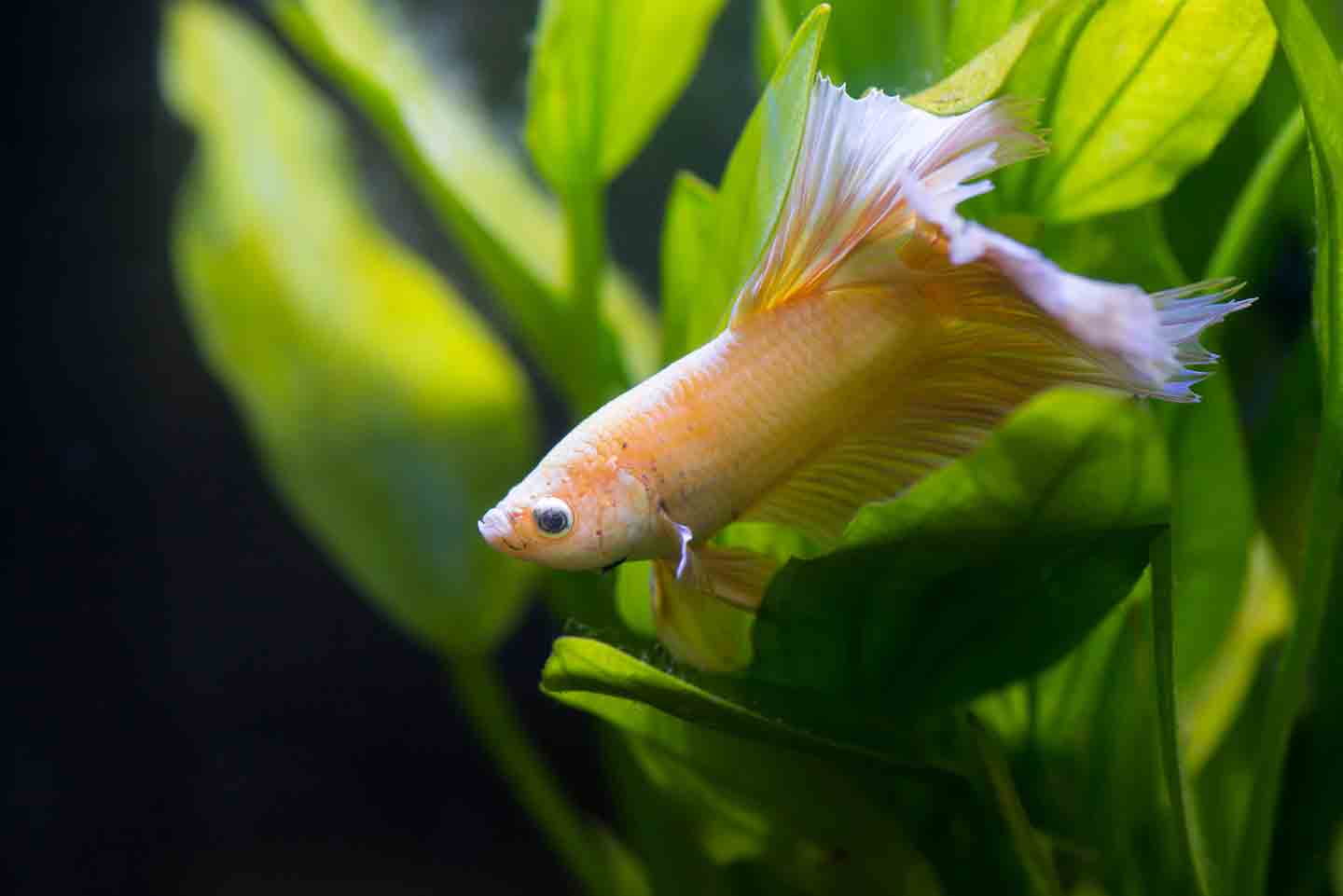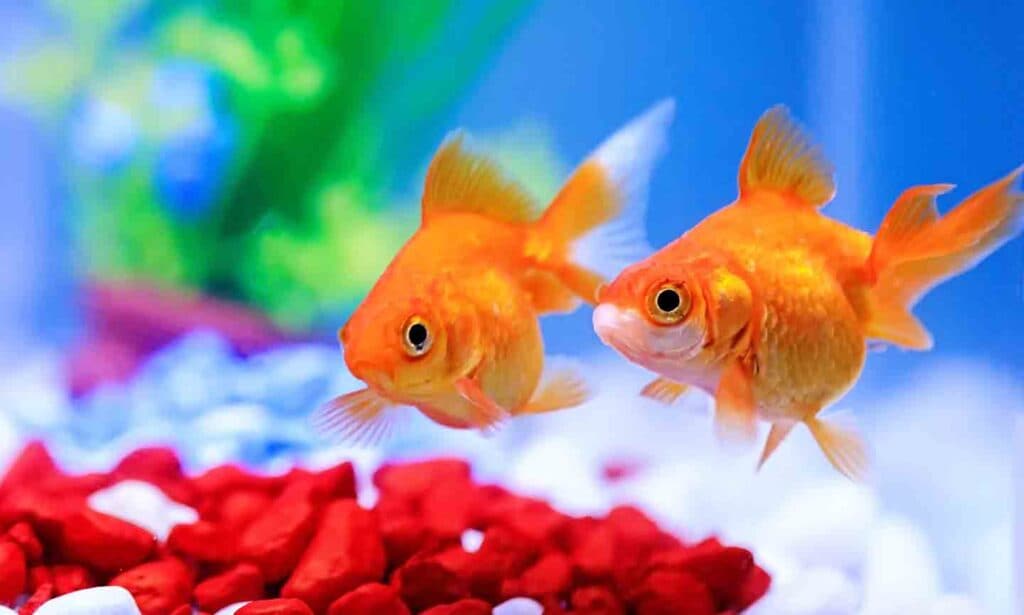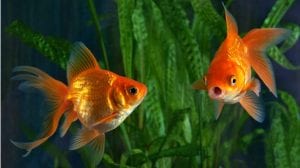In This Guide:
Do Fish Sleep?
Fish do sleep, but it doesn’t quite look the same as when you close your eyes and fall into a long, deep slumber.
“Think of it more as a ‘low power mode’ since they still need to be aware of their surroundings,” says Jessie Sanders, DVM, DABVP (Fish Practice), an aquatic veterinarian and owner of Aquatic Veterinary Services in Santa Cruz County, California.
Unlike other animals, fish don’t have eyelids, so their eyes remain open while they sleep. Once asleep, they slow down and tend to hover in a cozy spot, with their overall alertness and responsiveness to the environment decreasing slightly. This allows them to catch some R & R while still being able to react to any sudden movements or perceived threats.
How Do Fish Sleep?

Sleeping fish reduce their metabolic rate, breathing patterns, and movement. This helps them conserve energy and recover from physical exertion—just like humans and other animals do.
Most fish that you’d keep in a standard aquarium are more likely to fall asleep once it’s dark, notes Jena Questen, DVM, CertAqV, an aquatic veterinarian at Aspen Park Vet Hospital in Conifer, Colorado. She says, “It is important that fish get some periods of darkness each day so they can sleep restfully and not be kept under bright lights 24 hours a day.”
As for how long fish sleep, the duration varies between species. However, many fish rest for several hours a day, typically during periods of low light or darkness.
Where Do Fish Sleep?
Just as humans have restful areas to catch some sleep, fish also prefer to rest in quiet, calm locations where they feel protected.
“What they tend to do is find a safe, secure, snug corner somewhere in the tank—without excess water flow—where they can relax and sleep without getting bounced all around in the tank by other fish or moving water,” says Dr. Questen. Common sleeping areas for fish include caves or hidden spots near plants or decorations.
This behavior is similar to that of fish in the wild, which often rest in small, sheltered crevices among plants, seaweed, and algae. These areas have lower water flow (reducing movement while they rest) and provide camouflage to help keep them out of sight from predators.
How To Tell if a Fish Is Sleeping
Since fish sleep with their eyes open, it can be a little tricky to know when fish are actually asleep. The more you observe your aquatic friends, the more in tune you’ll become with their patterns and behaviors.
Here are some common signs of sleeping fish, according to Dr. Sanders and Dr. Questen:
- Settling toward the bottom of the tank
- Resting in a covered or protected area
- Slow, relaxed breathing
- Hovering in place (some movement is normal)
- Resting posture (they may seem less alert or tilt against a fixture)
- Color that appears slightly duller or muted during sleep (in some fish species)
Fish are also more likely to be at rest when there is low light and reduced commotion in and around their tank.
Is My Fish Dead or Sleeping?
A common question fish owners have is whether their gilled friend is simply taking a rest, not feeling well, or has passed away. Dr. Questen says that if a fish was perfectly fine and active a few hours ago and is now sitting still in the tank, it is most likely sleeping rather than dead or ill.
Sick fish might sit still like this all day long, which is a sign that something is wrong. A fish that isn’t moving or breathing is deceased; dead fish also tend to become buoyant and float toward the top of the tank, unlike sleeping fish that settle toward the bottom.
Fish Sleep FAQs
Q:Do fish sleep with their eyes open?
A:Yes. Fish sleep with their eyes open because they do not have eyelids. Even though their eyes remain open, their body slows down and they become less responsive to their surroundings.
Q:Do fish sleep at night?
A:Different fish have different sleeping patterns. Most types of fish that you’d keep in an aquarium have a pattern similar to humans, being active during the day and resting in the evenings. This is why providing them with hours of darkness is critical.
However, some fish are nocturnal, meaning they are most active at night and tend to rest more during the daytime. Others are considered crepuscular, which means they’re most active during dawn and dusk.
Q:Do fish still swim when they sleep?
A:Fish don’t actively swim around when they’re asleep, but you can expect some movement. They tend to find a cozy spot and then hover or gently bounce around slightly with the flow of the water in the tank. They typically try to sleep in a place where they can brace against a rock or ornament, so they don’t get buffeted around too much while they rest.
The next time you observe your fish enjoying their habitat, you’ll have a better understanding of their behavior. Make sure to keep their habitat clean, and keep an eye out for potential fish diseases so you can address any health issues immediately.
This content was medically reviewed by Chewy vets.
Share:













